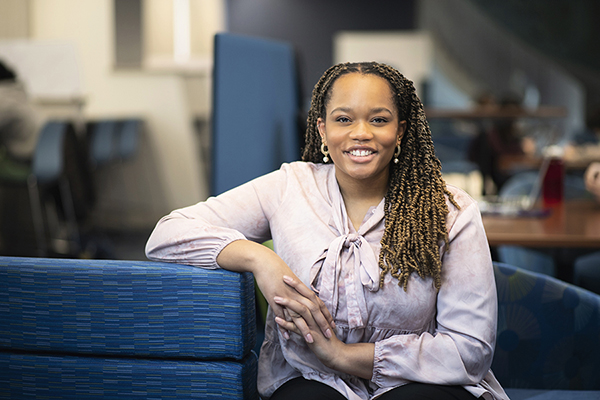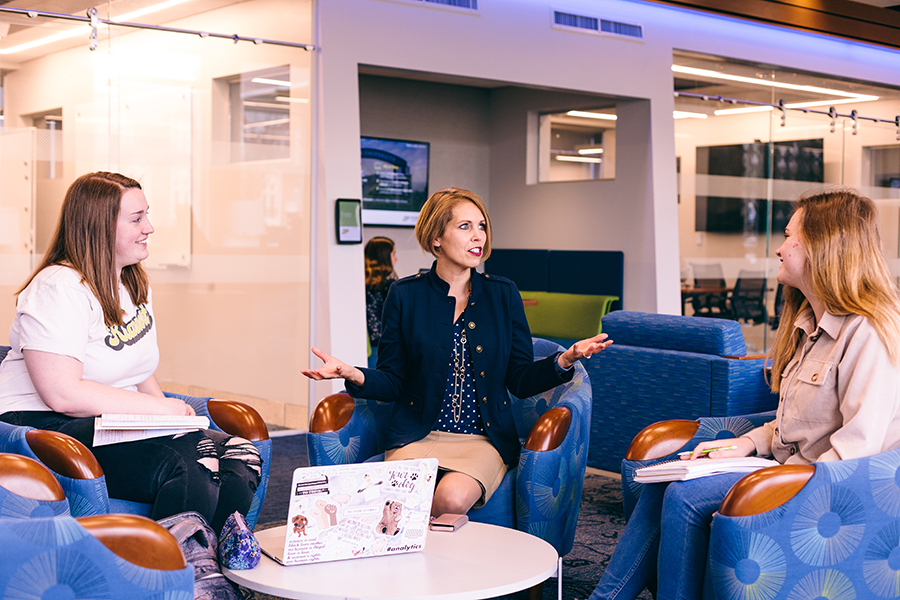
Positioned for Progress - Diversity, equity and inclusion initiatives take center stage
As larger conversations about social justice and equal opportunity in higher education continue to emerge across college campuses, Diversity, Equity and Inclusion (DEI) initiatives are rightly positioned at the forefront of many business schools.
At Krannert, those initiatives are now led by a pair of Dean’s Fellows for DEI — Darren Henry, managing director of the Dr. Cornell A. Bell Business Opportunity Program, and Roy Dejoie, an award-winning clinical associate professor. Their first step was assessing the school’s current DEI programming and determining how it fits under a common umbrella.
“We currently have four working subcommittees focused on curriculum, student experience, staff, and faculty,” Dejoie says. “With regard to curriculum, the idea is looking at the course material in the core, as well as the elective courses, and addressing extracurricular activities such as case competitions. The first deliverable is working to provide resources and opportunities for instructors and to meet them at their ability and comfort levels. We want to create transformational changes to their courses to present students with diversity and inclusion topics and situations to better prepare them to manage the 21st century workforce.”

As an example, Dejoie points to the efforts of Amy David, a clinical associate professor who has incorporated DEI into the case studies her students address in class. “The protagonist in the cases she’s collected is someone from an underrepresented group, whether it’s race or gender,” he says. “We're trying to make those kind of resources available in all courses, to allow students to meet us where they are or for us to meet them where they are.”
In the areas of student experience and staff, the respective subcommittees are looking at the internal climate of Krannert as it relates to issues including mentorship, retention, and promotion of DEI both inside and outside of the classroom, as well as in student organizations. “Through a survey of current students, we want to continue to develop school-wide events and activities to celebrate and promote DEI within Krannert,” Dejoie says.
Among the DEI goals for faculty are building a more diverse pipeline of PhD students and post-doctoral scholars through a strengthened partnership with the PhD Project, whose mission is to increase the diversity of business school faculty who encourage, mentor, support and enhance the preparation of tomorrow’s leaders.
“We’ve been involved with the PhD Project for many years, but we’re now working with Krannert Marketing and Communications to focus our efforts,” Dejoie says. “We’ll be using customer relationship management software to build and foster relationships over time, both in terms of looking at possible PhD students to come to Krannert for our programs, as well as recruiting PhD graduates to join our faculty.”
In addition, Krannert is partnering with the Math Alliance, which focuses on increasing the number of underrepresented or underserved American students pursuing a doctoral degree in a mathematical or statistical science.
Another example of Krannert’s DEI offerings is the Dismantling Bias Conference Series, which this year featured more than 30 speakers and took the theme of “Shifting Diversity, Equity, and Inclusion Paradigms for Workplaces of the Future.” The mission of the series is to advance knowledge and understanding that bridges the theory, science and practice of designing, implementing and evaluating evidence-based policies, practices, cultures, and interventions that promote inclusion and career equality for women and people of diverse social identity groups.
In an effort to foster the professional growth and development of a diverse talent pool, the Krannert School has also joined a coalition of Indiana universities and stakeholders to offer a groundbreaking Diversity in Leadership Program (DIL). Each partner institution hosts the program's cohorts on their respective campuses one weekend per month, led by faculty and staff from these institutions.
"Tim Ryan has explained that diversity helps to increase the size of the pie as opposed to making the pieces smaller in an existing pie,” says Dejoie of the senior partner at PwC and creator of the 1,600- member CEO Action for Diversity. “Krannert and its partners in DIL are embracing that spirit in supporting a shared commitment of serving underrepresented populations and enhancing current and future leaders who contribute to the growing diversity and success of their companies."
Other possible initiatives include a partnership with a Historically Black College and University (HBCU) to offer a joint masters/undergraduate degree offering. “It makes sense to build on what other people are doing and to help Krannert strengthen its flagship programs,” Dejoie says.
Among those flagship programs are the Dr. Cornell A. Bell Business Opportunity Program (BOP) and the Brock-Wilson Center for Women in Management, both of which have established records of promoting DEI initiatives.
“BOP is one of the oldest and most successful programs of its type, both at Purdue and nationally,” Dejoie says. “Likewise, the Brock-Wilson Center is getting more and more women interested in business. Anything we can do to expand their impact certainly becomes important.”

Legacy of Success
The day following the assassination of the Rev. Martin Luther King Jr. in April 1968, a group of Krannert faculty members approached then-dean John S. Day to establish a program to increase diversity and provide underrepresented students with access to a world-class management education.
The Business Opportunity Program (BOP), which enrolled 11 students in its first year, was among the first student-success programs to promote inclusion within a major business school and the first diversity program at Purdue.
In BOP’s second year, the late Dr. Cornell A. Bell was hired to direct its growth. Under his leadership, BOP blossomed into a nationally recognized program that recruits, enrolls, educates and provides support for both undergraduate and graduate students pursuing management careers. In 1996 the program was renamed in Bell’s honor.
Today, BOP has more than 1,400 alumni worldwide and boasts a five-year graduation rate of 88 percent. That’s higher than Purdue’s overall graduation rates for all students as well as for underrepresented students. The program is now under the direction of Henry, a 2007 BOP alumnus who was among Bell’s final class of MBA recruits.
At the undergraduate level, the program’s cornerstone is the BOP Summer Session, Henry says. Designed for incoming freshmen seeking a business degree from the School of Management, the rigorous eight-week session coincides with summer school and begins in June. Students take introductory business courses that count toward graduation and prepare them for the challenges of their first year.
Students live together on the same floor of a residence hall, get acquainted with campus culture, and learn about the resources on campus that can help them succeed. The relaxed summer atmosphere gives students the chance to acclimate to campus and college life early and assists them in the transition from high school to college.
“BOP is designed to put students on the path to the highest levels of corporate leadership,” Henry says. “From mentoring to networking, we’re among the best at the professional development of underrepresented business students.”

Jose Herrera, a junior majoring in accounting and finance, says the BOP Summer Session has been the most memorable experience of his time at Purdue. “It provided me with an experience to prepare myself for what was to come and allowed me to connect with my peers before the start of the semester,” he says. “The courses and curriculum are demanding and rigorous, but help prepare us for what we will experience in our careers."
Shanise Buford, a junior majoring in finance, says BOP gave her the confidence to pursue opportunities that she didn't think she would encounter during college.
“This has allowed me to broaden my network and continue to rise to a new level of success with each opportunity,” she says. “In addition, I have met like-minded people who have become some of my best friends and advocates. I have always had hard-working and goal-oriented people to study with, but I also have a sense of family who are there to celebrate with me or do something fun around campus."

BOP is now creating opportunities for top high school students from across the country to explore the world of business and learn how Krannert prepares students for a successful career post-graduation, Henry says.
By participating in BOP’s Future Scholars Summer Camp, high school students from historically underrepresented groups enhance their teamwork and leadership skills, get access to Fortune 500 leaders, Krannert faculty, and alumni, and learn more about the Purdue admissions process and financial aid opportunities.
Alumni are already looking forward to the next generation, including Tim Coleman, who earned a BS in industrial management in 1990 and currently serves as vice president of information technology in Eli Lilly and Company’s Medicines Development Unit.
“Diversity initiatives like BOP will continue to thrive and succeed only if we step forward and share our gifts, grace and example with future generations,” he says. “Creating a level playing field is vitally important. Everyone needs and deserves the same opportunities we received.”
Strategic Moves
Undergraduates participating in Krannert’s Brock-Wilson Center for Women in Management are on the move with renewed focus and expanding initiatives, says Cara Putman, the center’s new director and a clinical assistant professor of management.
“Roughly 40 percent of the School of Management undergraduate population are women, so the center is focused not only on recruiting more women, but also on creating a package that’s going to allow them to graduate as confident, holistic leaders,” she says. “We want them to develop strong academic skills in the classroom while enhancing out-of-class experiences.”
Toward that end, students will follow what Putman calls the ACE Roadmap. “We’re focusing on the things that these students need to be doing each semester while they’re here, as well as the career competencies and skills they should be acquiring.”
According to Putman, the center is taking a strategic look at what it already has in place and explaining to students why it’s important for them to engage with the various opportunities.
“For example, study abroad is an academic and a career competency type of experience. Employers are looking for students or recent graduates who are able to work in an intercultural context, and study abroad provides that,” she says. “It’s a really safe way to expose our students to what it’s like to learn and live in another culture while also moving towards graduation.”

Another example is the Women in Management Learning Community, an enhanced experience for first-year students who want to live with other young women interested in business and form a smaller cohort. “Krannert has 2,500 students, but a learning community has 20 to 30,” Putman says. “Even a large university can feel very personal when you’re in a learning community, and you gain a sense of belonging.”
Women in Management students can also take two courses their first year — Navigating Gender in the Workplace (MGMT 29400) and Bridging the Gender Divide at Work (MGMT 29450).
“Both courses equip young women with the tools to walk into any environment and be a confident advocate, as well as to step in if somebody else is experiencing the impact of gender issues in the workplace,” Putman says. “Students need to learn how to speak up effectively for themselves while also being part of the solution for other people.”
In MGMT 29450, students are paired with an alum who is in a career field of their interest. “They learn more about the graduate’s experience and get a sense of how gender plays out in the workplace,” she says. “It’s much more powerful when you can start hearing stories and experiences of individuals who are further down the path than you are. It provides context and a sense of space.”
The PowerShift Case Competition is another tool that the Brock-Wilson Center uses to help students explore real issues related to gender in the workplace. The most recent case focused on COVID implications for women.
“We’ve all seen the studies and research that shows that the pandemic has had a disproportionate impact on women having to leave the workforce because of situations like schools being shut down,” Putman says. “Students create plans to present to a business on how can they minimize the impacts for women, which gives them a chance to look at a real-world issue and advocate for a plan that balances the gender divide in a way they can understand.”

In partnership with the Purdue University Summer College for High School Students, Krannert’s Brock-Wilson Center offers an annual summer program for college credit, the Empowering Women in Business Fun Sized Course.
Designed for young women in high school, the five-day residential credit-bearing course on Purdue’s West Lafayette campus includes hands-on activities to promote team building and skills in leadership, confidence and negotiation. The program introduces students to the business principles of economics, strategy, marketing, supply chain and finance, while other fun and engaging activities provide a glimpse of life as a Purdue Boilermaker.
“That helps them imagine themselves at the School of Management, but more important, also imagine themselves in a business career,” Putman says. “When you have high school students who are good at math and science, they are traditionally pushed toward engineering and STEM without a recognition that business is actually a fantastic place for young women.”
More than 100 students took part in the course in 2021. “To keep expanding, we needed to break the summer course into two components,” she says. “It’s the same content and curriculum, but allows students to participate with a cap of 60 students instead of 100. That will give them more engaged interaction with each other, as well as with the faculty and with the staff, which hopefully will help them feel even more like Purdue and Krannert could be their future home.”
The center’s recruiting efforts expand beyond the summer course, however.
“We want to better reach young women and help them see themselves at Krannert,” Putman says. “Especially as we’re coming out of COVID, people are hungry for community even more than they were before. The Brock-Wilson Center is a place where young women can find a place where they belong, where they are welcomed, and where they can get the best experience possible while they’re at Purdue.”




